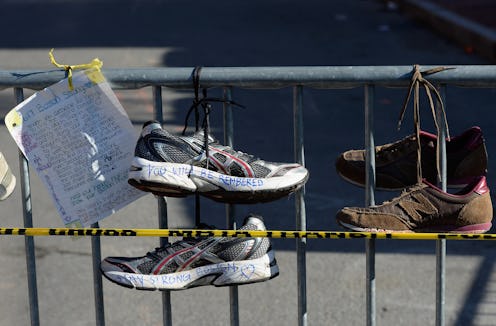News
Could Dzhokhar Tsarnaev Take A Plea Deal?
Monday marked the beginning of the trial of Boston Marathon bombing suspect Dzhokhar Tsarnaev. More than a year after the pressure cooker bombs that Tsarnaev and his older brother, Tamerlan allegedly planted at the finish line of the marathon, exploded, the city now has to come face-to-face with the Chechen-born U.S. citizen in the coming months to decide his fate. If convicted of the 30 charges that he has pleaded not guilty to, Tsarnaev could face the death penalty. But what is the likelihood of Tsarnaev's defense team making a plea deal, so the alleged bomber goes to prison for life instead of being executed?
Not unlikely, it seems. One of the lawyers on the Tsarnaev's formidable defense team is Judy Clarke, well known for her former high-profile clients — the Unabomber, Ted Kaczynski, Atlanta Olympics bomber Eric Rudolph, and Tucson shooter Jared Loughner, whose target, U.S. Rep. Gabrielle Giffords, survived a shot in the head. All three, thanks to Clarke, avoided the death penalty and got life sentences instead.
But the trial has since begun with the jury selection — in which 12 will be selected from a pool of over 1,200 potential jurors — and there has yet to be a plea deal.
It would seem sensible for the defense team to make a plea bargain, an agreement in which Tsarnaev pleads guilty in exchange for some sort of concession. In this case, it would be to dodge the death penalty, a punishment that even many Bostonians strongly oppose. Northampton defense attorney David Hoose told WBUR that a plea deal would shift the focus of the trial from Tsarnaev's life to that of the victims:
This case in particular is appropriate for resolution by a plea. Where there are so many victims involved and so many people whose lives would be disrupted and old memories brought to the fore again, there is more reason than in any case for there to be a plea.
There would still be a sentencing hearing; the major difference would be that after a plea the sentencing hearing is really focused entirely on the victims. At a penalty trial, what happens is that inevitably the bulk of the presentation deals with the defendant and it becomes much more about the defendant’s life rather than the victims’ lives.
In a Boston Globe op-ed by Nancy Gertner, a retired federal judge, now Harvard Law School professor, and Michael Keating and Martin Murphy, partners at the law firm Foley Hoag, they wrote:
Tsarnaev’s lawyers are duty-bound to bring every kind of mitigation before the jury; the judge is bound by law to let them do so; but should the survivors and the families of those who were murdered have to suffer through it?
If Tsarnaev is convicted of the crimes charged, he will die in prison. The only real issue is where and when. He can go to federal death row, where lawyers will bring appeals and post-conviction motions for years, where only three defendants have ever been executed, and where, as a prisoner slated for execution, he will continue to occupy the attention of the public, the judicial system, and extremists. Or he can be sentenced to spend the rest of his life in isolation, never to be heard from again, in a supermax cell in a maximum security federal prison built especially for those prisoners who are deemed the most dangerous, as has been the case with Unabomber Ted Kaczynski, 9/11 conspirator Zacharias Moussaoui, and Richard Reid, the shoebomber.
While the defense team has not indicated any signs of making a plea deal as of yet, it still has time — until the jury's verdict, actually — to do so. But WBUR reported that the deeper into the proceedings of a case, the less likely a plea will be made. If Tsarnaev is interested in a plea bargain, his attorneys would have approach the prosecutors, and then it will be up to U.S. Attorney General Eric Holder to determine whether or not the federal government will accept a guilty plea.
Holder, who has said that he is personally against the death penalty, authorized prosecutors to seek capital punishment for Tsarnaev's case, explaining:
The nature of the conduct at issue and the resultant harm compel this decision.
The trial will start around Jan. 26, according to Judge George O'Toole, and is expected to last three to four months.
Image: Getty Images (3)
